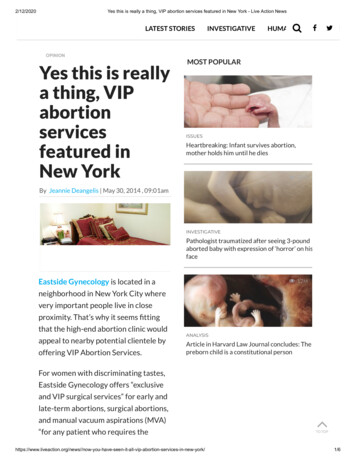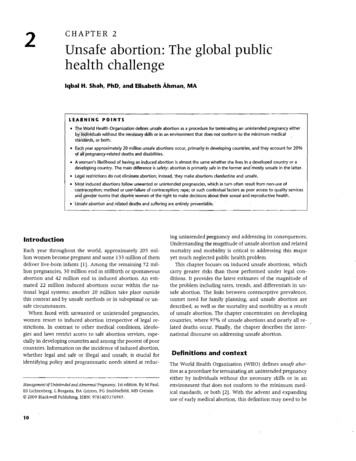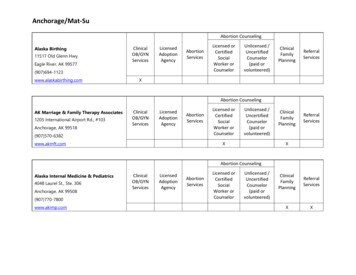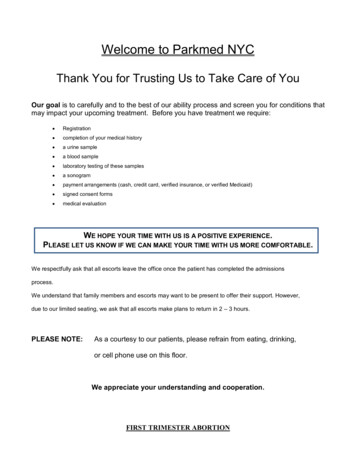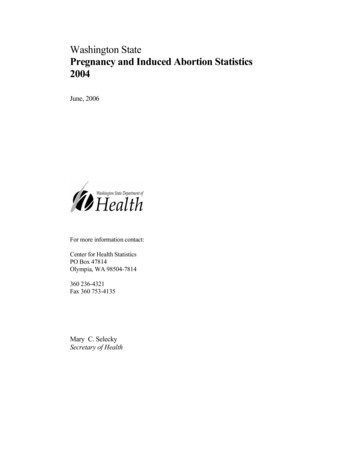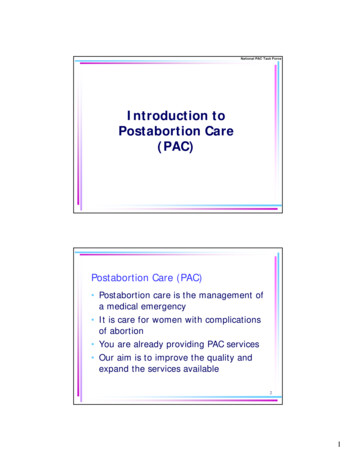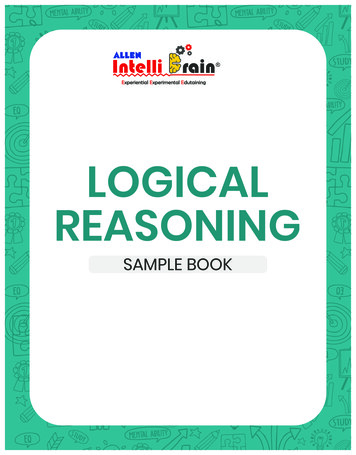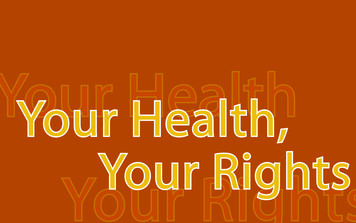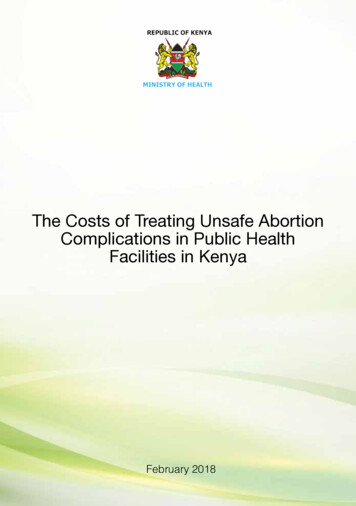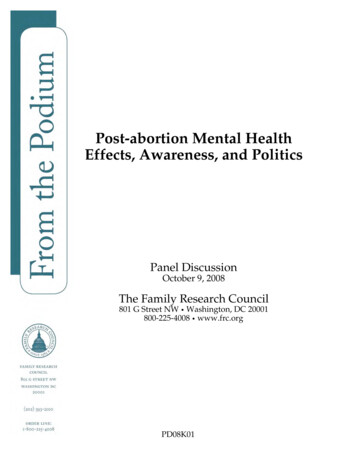
Transcription
Post-abortion Mental HealthEffects, Awareness, and PoliticsPanel DiscussionOctober 9, 2008The Family Research Council801 G Street NW Washington, DC 20001800-225-4008 www.frc.orgPD08K01
Table of Contents for Panel Presentations andMaterialsI.Abortion Trauma, Posttraumatic Stress Disorder (PTSD) &Complicated Grief – Vincent Rue, Ph.D. “Abortion Trauma, PTSD & Complicated Grief” - PowerPointpresentation “Post-abortion Syndrome: Diagnostic Criteria” “Induced abortion and traumatic stress: A preliminarycomparison of American and Russian women” - Study “Posttraumatic Stress Disorder After Abortion”II.Abortion and Mental Health Research – Priscilla Coleman, Ph.D. “Abortion and Mental Health Research” - PowerPointpresentation “Abortion and Women’s Mental Health” - Summary pageIII.Psychiatric Clinical Perspective and Grassroots Efforts to AddressPost-abortion Mental Health Effects – Martha Shuping, M.D. “Abortion Recovery” “Resources” “Post-abortion Grief: Evaluating the Possible Efficacy of aSpiritual Group Intervention” - StudyIV.Post-abortion effects and men – Catherine Coyle, R.N., Ph.D “Men and Abortion: A Review of the Research” – PowerPointpresentation “Men and Abortion: A Summary of Research Findings” –Summary pageV.Post-abortion awareness and politics Poll – David Reardon, Ph.D. “Politics and Post-abortion Awareness Survey”VI.Political Perspective and the Freedom of Choice Act (FOCA) -ThomasMcCluskey “Freedom of Choice Act Would Harm Women and Remove aLot of Freedoms” – Insight PaperVII.American Psychological Association (“APA”) Task Force Report onAbortion and Mental Health – Priscilla Coleman, Ph.D. “APA Task Force Report on Abortion and Mental Health: AViolation of the Ethics of Science and a Breech of PublicResponsibility” – PowerPoint presentation “Does Abortion Cause Mental Health Problems? The EvidenceThrough an Objective Scientific Lens as Opposed to the APA’sRecent Analysis”
VIII.Implications of the American Psychological Association Task ForceReport on Abortion and Mental Health – Vincent Rue, Ph.D. “Advocacy vs. Science: Implications of the APA Task ForceReport on Abortion” – PowerPoint presentation
Biographies of Panel SpeakersVince Rue, Ph.D.Director of the Institute for Pregnancy Loss in Jacksonville, Florida:Dr. Rue is the Director of the Institute for Pregnancy Loss in Jacksonville, Florida,an independent non-profit research & treatment center. Dr. Rue received hisPh.D. in Child Development and Family Relations from the University of NorthCarolina in 1975. For 33 years Dr. Rue has been a practicing psychotherapist andhas served on the faculty of California State University at Los Angeles andUnited States International University in San Diego. In 1981, Dr. Rue providedthe first clinical evidence of postabortion trauma, identifying this psychologicalcondition as “Postabortion Syndrome” in testimony before the U.S. Congress. Inl984, he published one of the first articles on abortion’s impact on men andrelationships and over the years has treated numerous women and men whohave been traumatized by their abortion experience. During the ReaganAdministration, Dr. Rue was a special consultant to the U.S. Surgeon General,Dr. C. Everett Koop, on abortion morbidity. In addition to his clinical work, Dr.Rue also serves as a litigation consultant assisting numerous offices of the stateAttorneys General in abortion and family related statutory challenges. He is aFellow of the American Academy of Experts in Traumatic Stress and a Memberof the International Society for Traumatic Stress Studies, the Association forPsychological Science, and the American Psychological Association. He haslectured throughout the United States, and has also presented in North andSouth America, Europe and Asia. Dr. Rue has authored one book and numerousprofessional journal articles on the topic of postabortion trauma and has been theprincipal investigator of the International Pregnancy Loss Research Project. He isalso the co-founder of two new online research and education-oriented postabortion sites: abortionresearch.net and standapart.org.Priscilla Coleman, Ph.D.Associate Professor of Human Development and Family Studies at BowlingGreen State University, Ohio:Dr. Coleman is an Associate Professor of Human Development and FamilyStudies at Bowling Green State University. Dr. Coleman received her Ph.D. inLife-Span Developmental Psychology from West Virginia University in 1998. Amajor concentration of Dr. Coleman’s research has been on the psychologicaloutcomes of abortion, and her recent studies address the impact of abortion oninterpersonal relationships (parenting and intimate partners). Additionalresearch has focused on mother-child interaction, attachment, and thedevelopment of competency beliefs across the transition to parenting. The authorof over 40 peer-reviewed articles, Dr. Coleman has published numerous studiesin psychology and medical journals on the psychology of abortion, and she haspresented her research to national and international audiences. Dr. Coleman hasalso served as an expert on state and civil cases related to the harmful effects ofabortion, and she is on the editorial boards for two international medicaljournals.
Catherine Coyle, RN, Ph.D.Co-Director of the Alliance for Post-Abortion Research & Training:Catherine Coyle earned her doctorate in Educational Psychology (area of HumanDevelopment) at the University of Wisconsin. She is a registered nurse andholds a master’s degree in clinical psychiatric nursing. She has taught at bothEdgewood College and the University of Wisconsin in Madison. Dr. Coyle hasdeveloped a healing program for men who have been hurt by abortion and hasscientifically documented its effectiveness. She is the author of the book, Menand Abortion: A Path to Healing, which is based on her research and is availablefrom Life Cycle Books (1-800-214-5849). Dr. Coyle is an associate of theInternational Forgiveness Institute and continues to pursue research in the areasof both forgiveness and post-abortion trauma. She has published several papersand given numerous presentations concerning these topics. Contact via e-mail at:ctcoyle@abortionresearch.netDr. Coyle is on the advisory boards of the International Forgiveness Institute andthe Care Net Pregnancy Center of Dane County, and is a board member of theWisconsin Medical Society Foundation.Martha Shuping, M.D.Psychiatrist, Shuping & Associates, Winston-Salem, North Carolina:Dr. Martha Shuping earned her M.D. degree from Wake Forest University Schoolof Medicine, Winston-Salem, NC, in 1984. She completed a 4-year psychiatryresidency at Wake Forest University Baptist Medical Center in 1988. She currentlypractices in Winston-Salem, NC. Dr. Shuping has had extensive experience inworking with women who have had abortion issues. She has served as facilitatorfor the Rachel’s Vineyard weekend retreats, and has trained professionals andpeer counselors for abortion recovery programs in Europe, Asia, and throughoutthe U.S. She has taught continuing education workshops for physicians andnurses, and has also presented workshops on women’s health after abortion atthe United Nations. She has authored articles and books relating to abortionrecovery, including The Four Steps to Healing (with Debbie McDaniel).http://www.postabortionhealing.net .David Reardon, Ph.D.Director of the Elliot Institute, Springfield, Illinois:David C. Reardon, Ph.D., director of the Elliot Institute, is a biomedical ethicistand a leading expert on the aftereffects of abortion on women, a field in which hehas specialized since 1983. He is the author of numerous books and popular andscholarly articles on this topic.His studies have been published in such prestigious medical journals as theBritish Medical Journal and the American Journal of Obstetrics and Gynecology,and have shown that, compared to childbirth, abortion is associated with higherrates of maternal death, subsequent substance abuse, clinical depression, andpsychiatric hospitalization.
He is the author of numerous books on the effects of abortion on women,including, Aborted Women, Silent No More, and Victims and Victors: Speaking OutAbout Their Pregnancies, Abortions, and Children Resulting from Sexual Assault, withJulie Makimaa and Amy Sobie. He is also co-author of Forbidden Grief: theUnspoken Pain of Abortion with Dr. Theresa Burke.Articles about Dr. Reardon and his work have appeared in numerous magazinesand newspapers, including Newsweek and the New York Times.Thomas McCluskyVice President for Government Affairs, Family Research Council, Washington,D.C.:As Vice President of Government Affairs for Family Research Council, TomMcClusky has represented the organization before Congress since 2003 on avariety of issues, including education policy, tax reform, faith-based initiatives,and the sanctity of marriage.Mr. McClusky has a long history of both local and national campaign experience.His first job in Washington, D.C. was with the Republican National Committeeas a political analyst. Following the 1992 elections, Mr. McClusky worked as alegislative/legal analyst for the multi-billion dollar Coastal Corporation.In 1998, Mr. McClusky became Senior Policy Analyst for National TaxpayersUnion and National Taxpayers Union Foundation (NTU/NTUF) where heworked on a daily basis with Members of Congress and their staff. While atNTUF he wrote a number of presidential candidate agenda reports which had acritical role in providing non-partisan fiscal perspectives on the 2000 election.
Vincent M. Rue, Ph.D.*Institute for Pregnancy LossJacksonville, FloridaE-mail: vincerue@bellsouth.netRue: Abortion Trauma, PTSD &Complicated Grief2Post-abortion TraumaWHO TOBELIEVE? is 27 years old continues to be politically incorrect in the USA is increasingly acknowledged by the public is denied by the media and abortion rightsproponents is denied or minimized by American mental healthorganizations is more accepted by international mental healthorganizationsRue: Abortion Trauma, PTSD & Complicated Grief3Basic AssumptionsRue: Abortion Trauma, PTSD & Complicated GriefMental Health Realities of Abortion Abortion is an intentionally caused human death event. it cancause serious and lasting adverse mental health outcomes formany women and men Insufficient evidence confirming abortion’spsychological safety No credible evidence documenting abortion’smental health benefits The patient’s perception of the abortion event is determinative If abortion is perceived as violating one’s moral code orreligious values, it is likely to precipitate significant intrapsychicconflict and present a risk to one’s mental health. Abortion is contraindicated when undertakenfor mental health reasons Individuals may be asymptomatic following an abortion,experiencing intense psychological sequelae months, years oreven decades later. Untreated traumatic stress complicates andthwarts grief responsesRue: Abortion Trauma, PTSD & Complicated Grief4 Abortion can place mental health at risk5Rue: Abortion Trauma, PTSD & Complicated Grief6
Continuum of Mental Health Risksfrom Induced AbortionPostabortionDistressPostabortionAnxiety & MoodDisorders(PAS or PTSD)PostabortionPsychoticDisordersWhen an abortion is traumatic,and cannot be openlyacknowledged, publicly mournedor socially supported, thewoman/man lives in isolation anddreaded silence. For such anindividual, grief is"disenfranchised."SuicideorHomicideRue: Abortion Trauma, PTSD & Complicated Grief7Traumatic Stressor (DSM-IV*)PostabortionSyndrome (PAS) “the person experienced, witnessed or wasconfronted with an event or events thatinvolved actual or threatened death orserious injury, or a threat to the physicalintegrity of self or others”is a Type ofPosttraumatic StressDisorder “the person’s response involved intense fear,helplessness, or horror”*American Psychiatric Association, Diagnostic & Statistical Manualof Mental Disorders IV, 1987Rue: Abortion Trauma, PTSD & Complicated GriefPAS/PTSD Diagnostic CriteriaWhat Is Abortion Trauma? Unwanted Re-experiencing Persistent Avoidance Increased Arousal (not present Overwhelming stressat the abortion clinic Participation in theintentional and actualdeath of my unbornchild or later learningof thisbefore the abortion Significant Distress orImpairment in Functioning Symptom Duration: 1 month Rue: Abortion Trauma, PTSD & Complicated Grief10Polly Becker, WSJ 200811 Feelings of fear,horror andhelplessnessRue: Abortion Trauma, PTSD & Complicated Grief12
Epidemiology of PTSDBaby on the Brain Prevalence of trauma exposure is higherin men (%) M:F 61:51 Women exposed to trauma are twice aslikely to develop PTSD (20.4% vs. 8.2%) Lifetime prevalence of PTSD twice as highfor women vs. men (10.4% vs. 5.0%)Kessler, et al. Arch Gen Psychiatry. 1995; 52:1048.Used by permission of the artist, Anita Kunz13Rue: Abortion Trauma, PTSD & Complicated Grief14Rue: Abortion Trauma, PTSD & Complicated GriefTrauma Can Produce SeriousPsychological DisordersUp to 50% of patients with PTSDgo on to have a chronic course ofthis illness across their lifetime. Marshal et al. Am. J. of Psych. 2001, 158: 1982-1988Rue: Abortion Trauma, PTSD &Complicated Grief16PTSD Avoidance SymptomsAttributed to Abortion% with 3 or more avoidancesx3369Difficulty remembering46Avoided thinking or talkingabout abortion1950Withdrew from family &friends30Loss of interest4Difficulty being near babies424253Emotionally Numb120Source: Rue et al. (2004)Rue: Abortion Trauma, PTSD & ComplicatedGrief17RussianAmerican610203040Rue: Abortion Trauma, PTSD &Complicated Grief506018
PTSD Arousal SymptomsAttributed to AbortionPTSD Re-experience SymptomsAttributed to Abortion% with 1 ormore reexperience sx% with 2 ormore arousalsymptoms486546Preoccupationwith abortionRussianAmerican1730Unwantedmemories ofabortion47301020Source: Rue et al. (2004)30234050Rue: Abortion Trauma, PTSD &Complicated Grief607019Cognitive Impact of Abortion Trauma –Shattered Assumptions The world is ce: Rue et al. (2004)10152025Rue: Abortion Trauma, PTSD &Complicated Grief3020Abortion & Disrupted CognitiveSchema (TSI Belief Scale Scores)* 242 for battered women (Dutton, 1994) The self is notinnocent 244 for outpatients at mental health clinic(Pearlman & MacIan, 1992) The world is notmeaningful The self is notworthy 260 for women aborting (Rue et al.,2004)*The higher the scores, the greater the cognitive disruption.Rue: Abortion Trauma, PTSD &Complicated GriefAmy, 34 years old21Rue: Abortion Trauma, PTSD & Complicated Grief22
Postabortion Syndrome:Diagnostic Criteria*A. EXPOSURE TO TRAUMA: Both of the following are present:(1) the person has experienced, witnessed or was confronted with an abortion eventwhich was perceived as traumatic and involving the actual and intentional death ofthe unborn child.(2) the person s response involved intense fear, helplessness, or horror so as to causesignificant symptoms of re-experience, avoidance, increased arousal and impactedgrief.B. REEXPERIENCE: The abortion trauma is re-experienced in one or more of the followingways:(1) recurrent and intrusive distressing recollections of the abortion experience(2) recurrent distressing dreams of the abortion or of the unborn child (e.g. baby dreamsor fetal fantasies)(3) acting or feeling as if the abortion event were recurring (includes reliving theexperience, illusions, hallucinations, dissociative [flashback] episodes)(4) intense psychological distress at exposure to events that symbolize or resemble theabortion experience (e.g., medical clinics, pregnant mothers, babies, subsequentpregnancies), as well as experiencing anniversary reactions of intense grievingand/or depression on subsequent anniversary dates of the abortion or on the projecteddue date for delivery(5) physiological reactivity on exposure to internal or external cues that symbolize orresemble as aspect of the abortionC. AVOIDANCE: Persistent avoidance of stimuli associated with the abortion trauma ornumbing of general responsiveness (not present before the abortion), as indicated by at leastthree of the following:(1) efforts to avoid thoughts, feelings or conversations as well as efforts to deny thoughtsor feelings associated with the abortion or negative personal meaning derived fromthe experience(2) efforts to avoid information, activities, places, or people that arouse recollections ofthe abortion trauma(3) inability to recall an important aspect of the abortion trauma(4) markedly diminished interest or participation in significant activities(5) feeling of detachment or estrangement from others, including withdrawal inrelationships and/or reduced communication(6) restricted range of affect, e.g., unable to have loving or compassionate feelings(7) sense of a foreshortened future, e.g., does not expect to have a career, marriage orfuture children, or a normal life span
POSTABORTION SYNDROME (Continued)2D. ASSOCIATED FEATURES: Persistent symptoms of increased arousal (not present beforethe abortion trauma) as indicated by two or more of the following:(1) difficulty falling or staying asleep(2) irritability or outbursts of anger (e.g., at self, others, male partner, God, doctor)(3) difficulty concentrating(4) hypervigilance(5) exaggerated startle response to intrusive recollections of the abortion trauma(6) depression and/or suicidal thinking(7) persistent feelings of guilt about surviving when one s unborn child did not(8) significant symptoms of self devaluation and/or an inability to forgive one s self(9) secondary substance abuse(10) symptoms of eating disorder(11) loss of sexual interest or acting out with multiple sexual partnersE. DURATION: Symptoms in B, C, & D last more than 1 monthF. IMPAIRMENT: Disturbance causes clinically significant distress or impairment in social,occupational, or other important areas of functioning.G. ONSET:(1) Acute (if duration of symptoms is less than 3 months)(2) Chronic (if duration of symptoms is 3 months or more)(3) Delayed (if onset of symptoms is at least 6 months after the stressor)*Developed by and revised by Vincent M. Rue, Ph.D. from diagnostic criteria for Posttraumatic Stress Disorder (DSMIV: 309.81), American Psychiatric Association, Diagnostic and Statistical Manual of Mental Disorders, Washington,D.C.: APA, 1994, pp. 427-429. Postabortion Syndrome was first identified by Rue in 1981. While the AmericanPsychiatric Association has not yet affirmed the existence of a clinical syndrome under the diagnosis of APostabortionSyndrome,@ it has identified abortion as a type of Apsychosocial stressor@ (DSM III-R, p. 20, 1987). The most currentdiagnostic manual, DSM-IV, does not reference or include the diagnosis of APostabortion Syndrome,@ but does identifythe Adeath of a family member@ as a type of psychosocial problem capable of causing PTSD.
Med Sci Monit, 2004; 10(10): SR5-16PMID: 15448616WWW. M ED S CI M ONIT .COMSpecial ReportReceived: 2004.02.03Accepted: 2004.04.22Published: 2004.10.01Induced abortion and traumatic stress: A preliminarycomparison of American and Russian womenAuthors’ Contribution:A Study DesignB Data CollectionC Statistical AnalysisD Data InterpretationE Manuscript PreparationF Literature SearchG Funds CollectionVincent M. Rue1ABCDEFG, Priscilla K. Coleman2CDEF, James J. Rue3AEF,David C. Reardon4CDEFSR1Institute for Pregnancy Loss, Jacksonville, FL, U.S.A.2Human Development and Family Studies, Bowling Green State University, Bowling Green, OH, U.S.A.3Sir Thomas More Clinic, Downey, CA, U.S.A.4Elliot Institute, Springfield, IL, U.S.A.Source of support: Partial funding for this study was made possible by grants from the Trust Funds Foundationand the Alberto Vollmer vidual and situational risk factors associated with negative postabortion psychological sequelae have been identified, but the degree of posttraumatic stress reactions and the effects of cultureare largely unknown.Retrospective data were collected using the Institute for Pregnancy Loss Questionnaire (IPLQ)and the Traumatic Stress Institute’s (TSI) Belief Scale administered at health care facilities to 548women (331 Russian and 217 American) who had experienced one or more abortions, but no other pregnancy losses.Results:Overall, the findings here indicated that American women were more negatively influenced by theirabortion experiences than Russian women. While 65% of American women and 13.1% of Russianwomen experienced multiple symptoms of increased arousal, re-experiencing and avoidance associated with posttraumatic stress disorder (PTSD), 14.3% of American and 0.9% of Russian women met the full diagnostic criteria for PTSD. Russian women had significantly higher scores on theTSI Belief Scale than American women, indicating more disruption of cognitive schemas. In thissample, American women were considerably more likely to have experienced childhood and adulttraumatic experiences than Russian women. Predictors of positive and negative outcomes associated with abortion differed across the two cultures.Conclusions:Posttraumatic stress reactions were found to be associated with abortion. Consistent with previousresearch, the data here suggest abortion can increase stress and decrease coping abilities, particularly for those women who have a history of adverse childhood events and prior traumata. Studylimitations preclude drawing definitive conclusions, but the findings do suggest additional crosscultural research is warranted.key words:Full-text PDF:Word count:Tables:Figures:References:Author’s address:abortion trauma posttraumatic stress disorder psychological sequelae women’s reproductive healthhttp://www.MedSciMonit.com/pub/vol 10/no 10/4923.pdf46457150Vincent M. Rue, Institute for Pregnancy Loss, 1574 Scottridge Lane, Jacksonville, FL 32259, U.S.A.,e-mail: vincerue@bellsouth.netIndexed in: Current Contents/Clinical Medicine SCI Expanded ISI Alerting System Index Medicus/MEDLINE EMBASE/Excerpta Medica Chemical Abstracts Index CopernicusSR5
Special ReportBACKGROUNDBeyond politics, increasing public health concern is focusing on the adverse emotional outcomes women can experience following abortion [1–15]. Researchers on both side ofthe abortion debate agree that some women’s mental healthis negatively impacted by abortion and that more investigation is warranted to better assist those women and to prevent future harm to others.Extensive research has documented how traumatic stresscan significantly alter individuals’ lives [16]. Traumatic stressors are strong predictors of PTSD. While the lifetime prevalence of PTSD has been estimated to be up to 12% of U.S.women [17], limited research has examined the role of induced abortion as a traumatic stressor.Anxiety and depression have long been associated with induced abortion [18]. In a major review of the literature,anxiety symptoms were identified as the most common adverse postabortion response [19]. As an anxiety disorder,posttraumatic stress disorder (PTSD) can be identified withan overwhelming and life-threatening event and with an inability to process the trauma. Earlier research reported aconnection between experiencing a traumatic abortion andthe onset of posttraumatic stress related symptoms [20–24].These studies were limited due to their reliance upon eithercase studies or small samples, with the exception of one larger study that reported a 1% incidence of PTSD followingabortion [25]. The present study focused on the degree towhich induced abortion was associated with posttraumaticstress and whether or not posttraumatic responses following abortion were evident in another culture.Women’s psychological responses to abortion are likely influenced by complex socio-cultural factors. In some nationsthe social environment surrounding abortion is defined bystrong moral sanctions against it; whereas in other parts ofthe world abortion is a passively accepted medical practice.The present study represents an exploratory comparison ofabortion reactions of American and Russian women. Thecomparison of these two groups is especially interesting because abortion continues to be a highly charged political issue in the United States since its legalization in 1973, whilethere has been very little political controversy about abortion in Russia following its legalization in 1955. For manyyears, Russian women have used abortion as one of theirprinciple means of birth control due to the relative scarcity of other birth control options; although more restrictivepolicies are emerging [26–28].Some research has suggested that PTSD is not just limited toEuro-Americans [29]. However, assessment of PTSD symptoms may vary widely due to ethnocultural influences [30–32]. While there is some evidence of PTSD following abortion in the U.S. [20–24], no equivalent research has beenconducted with Russian women. Hence, the primary purpose of this research was to examine whether or not abortion was perceived as traumatic, and if so, whether or not itsmanifestations were equivalent to PTSD symptoms in bothAmerican and Russian women. The secondary purposes ofthis research included identifying demographic and pregnancy circumstances most predictive of possible negativeoutcomes, as well as evaluating the extent to which negativeSR6Med Sci Monit, 2004; 10(10): SR5-16responses could be due to cultural factors, rather than individual characteristics in American and Russian women.MATERIAL AND METHODSParticipantsWomen who had experienced a pregnancy loss (spontaneous abortion, induced abortion, stillbirth, or adoption)were asked to participate in a study of women’s reactionsto a pregnancy loss. Data were collected in 1994 at U.S. andRussian healthcare facilities (public and private hospitals,and health care clinics). All women between the ages of 18and 40 were surveyed on a continuous basis until 992 women with at least one pregnancy loss had been identified. Thesample used in the current study includes only those womenwho had one or more induced abortion and no miscarriages,stillbirths, or adoptions (n 548 or 55.2% of the larger sample). If multiple abortions were reported, the respondentwas asked to identify and only report on the “most stressful”one. As to nationality, the sample used in the current studyincluded 331 Russian and 217 American women.At the time of their reported abortion experience, the meanage of the Russian women was 22.11 (SD 5.80) and forthe American women, the mean age was 23.07 (SD 5.71).The mean age at the time the women completed the questionnaire was 28.24 (SD 9.67) for the Russians and 33.86(SD 8.85) for the American. Among Russian women, themean number of weeks pregnant at the time of the abortion was 6.75 (SD 3.19); whereas among the Americanwomen, the mean number of weeks pregnant was 10.07(SD 4.55).ProcedureData were collected at one urban hospital in Russia andone urban hospital and two medical outpatient clinics inthe United States. At the Russian national hospital, whichspecialized in women’s health, all women seeking healthcare were asked by a staff physician to participate in the research. After several consultations with Russian physiciansand demographers, as well as piloting the Russian versionof the IPLQ, it was determined that the optimum form ofdata collection to ensure completeness and patient comprehension was to have staff doctors interview the patient/respondents. The considerable difficulty in translating theavoidance criteria of PTSD into Russian and concern regarding patient comprehension motivated the use of interviews as opposed to questionnaires in Russia. The participating Russian physicians were trained on the researchpurposes and particulars of using the IPLQ as an interviewguide. Mental health facilities were purposefully excludedas data collection sites to prevent the selection of subjectsfrom a “pathology-oriented” population.In the U.S, each subject completed a written questionnaire.A study monitor at each of the three data collection sites wasavailable to respond to any questions or concerns. In Russia,a staff physician interviewed each female patient and completed the questionnaire on her behalf in order to minimizecross-cultural misinterpretations of question wording. In allcases, respondents were informed of the following: (1) thattheir participation in the research was voluntary; (2) that all
Med Sci Monit, 2004; 10(10): SR5-16responses were anonymous; (3) that they had the right torefuse participation and that non-participation would notinfluence their healthcare; (4) that they had the right todiscontinue participation in the research at any point; and(5) that counseling was available afterwards if so requested.The administration time was 15 to 20 minutes. Due to funding and staff limitations, no data were collected on womenwho chose not to participate.MeasuresThe two data collection instruments used were the Institutefor Pregnancy Loss Questionnaire (IPLQ) and the standardized Traumatic Stress Institute’s (TSI) Belief Scale - VersionK originally developed by Pearlman [33]. The scale wassubsequently revised to Version L [34] and has now beenrenamed the Trauma & Attachment Belief Scale [35,36].A university-based human subjects review panel approvedthe use of the IPLQ and it was pre-tested using college agestudents.The IPLQ included two major sections. The first section included demographic and background information. The latter included questions related to likely control variables including stressors that might pre- or postdate the abortion.The second section of the IPLQ presented subjects with acognitive/emotional/behavioral checklist of positive andnegative effects of abortion that had been previously reported in the literature. Subj
American Psychological Association ("APA") Task Force Report on Abortion and Mental Health - Priscilla Coleman, Ph.D. . Attorneys General in abortion and family related statutory challenges. He is a . Development) at the University of Wisconsin. She is a registered nurse and holds a master's degree in clinical psychiatric nursing .
